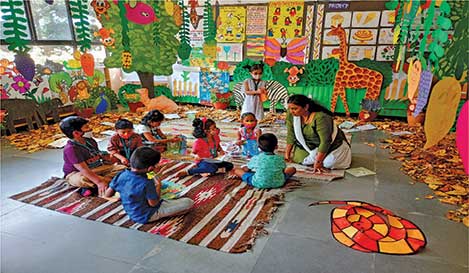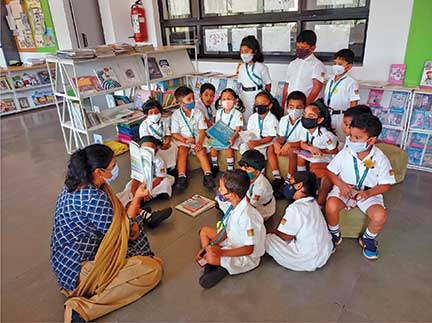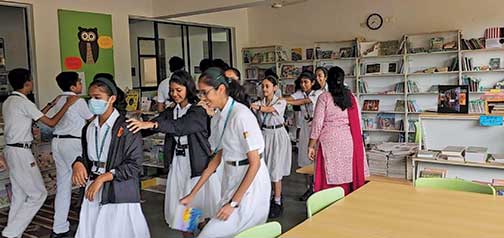Poornima N
My second home is my school, where I play multiple roles – student, colleague, friend, teacher, and most importantly for me, that of a second mother to the children. As a pre-primary teacher, this is not just a job for me but my identity, my heart, and my soul. While there’s a common perception that being a pre-primary teacher is simple – involving singing, dancing, and fun – for me it encompasses a profound sense of emotion and responsibility. Until 2021, I was a pre-primary teacher. However, in 2021, my journey with the library opened through an enrollment in Bookworm’s Library Educators Certificate Course (LEC). This journey has reshaped my perception of books and libraries and their role in the lives of children. The LEC transformed my outlook, unveiling books as living entities with voices and the library as a dynamic organism.

The LEC’s blend of contact sessions, reading materials, and virtual interactions prompted a profound reconsideration of the role of libraries in cultivating community spaces and experiences. It encouraged me to reflect on how to infuse liveliness into libraries, to enable them to be spaces that are energetic, social, and interactive hubs. The course prompted essential questions about the pivotal role of library personnel in fostering an active library and cultivating reader interest. One key revelation was the transformative power of the story and books. As educators, we are depicted as wielders of magic wands, weaving narratives that captivate and resonate with children. I observed, when reading books with my students that they effortlessly drew connections to their own lives – finding surprises and learning within the magic of stories.
My understanding of pedagogy deepened, and I now consider myself someone who supports students in becoming lifelong readers and learners. The emphasis for me is on actively promoting reading through various activities, and maintaining a friendly, helpful and vibrant atmosphere for students and other members.
However, this journey was not without surprises. The first challenge was my field project. As a pre-primary teacher, my interactions were primarily with children aged 4-5 years and I needed to figure out an in-depth library activity with this age group. This warranted a fresh, critical lens through which I could examine the elements of a library – collection, people, interactions, activities, administration, space, and values. I decided to explore non-fiction books. My field project taught me that non-fiction books trigger questions, provide answers, and open up new avenues for exploration and discussion. When I opened a book about pigs, some kids exclaimed in their mother tongue, “panni kutti,” and burst into laughter. When questioned, they expressed their dislike for the animal and considered it dirty. However, as we delved into reading and sharing facts about pigs, their curiosity grew, and they became eager to learn more. They were pleasantly surprised to discover that the pigs appeared dirty because they often wallow in mud puddles, which serves as a way for them to stay cool. The children engaged in a discussion among themselves, concluding that pigs don’t have fans or air conditioning, leading them to adopt such behaviours. It was heartwarming to witness their understanding unfold. This marked the expansion of my role – from being a pre-primary teacher to a library educator with the responsibility of introducing books, beyond the realm of fiction, to young children.

This effort didn’t stop within my classroom. With full support of the school management, I initiated sessions with our teachers and the school librarian. I engaged in various activities with our teachers, among them, character-alive and book talks stood out. The teachers continue to refine their book talk skills and engage in surfing books. During these sessions, a group of junior school teachers take the initiative to conduct book talks, recommend books and share book talks with other peer group teachers. These book talks aim to captivate audiences and generate interest in a particular book. The emphasis is on intriguing plot points, characters, and themes to create suspense and spark curiosity. Connecting books to real-life experiences enhances relatability, and the presenter’s genuine enthusiasm and personal impressions serve as inspiration. Including diverse genres and authors caters to different interests, and visual aids such as book covers add to the overall appeal. Collaborative discussions led to vibrant and enhanced collection of books in the junior classrooms. The teachers of these junior classes now play an active role including in lending of these books. I’d like to mention a ‘character-alive’ that I did from the book, ‘Ponni the flower seller’ by Sirish Rao, which remains vivid in the minds of our teachers. This has become a permanent fixture in their memories, ensuring that they won’t forget the art of presenting a character-alive. I have also received appreciation emails from some of our teachers regarding the effectiveness of this ‘character-alive’ approach. I introduced ‘pop-up libraries’ in the main areas of the school during parent meetings and major events when parents are involved. These steps mark my journey together with my supportive colleagues to bring books closer to students and parents alike.
The LEC net is a strong net, even though I am most comfortable being with my pre-primary children, the Bookworm team continuously pulls me out of my comfort zone leading to fresh learning.
The term ‘Library Audit’ took on a new significance in our school, where Bookworm spearheaded the initiative, and I actively participated. This experience provided me with a profound understanding of library elements. I engaged in the de-cataloguing of books, gaining insights into curating collections and creating mini displays on shelves. Collaborative thinking with the team proved instrumental in strategically placing books throughout the school. Multiple copies and reference materials found their way to labs, classrooms, and other resource areas, easily accessible to both teachers and students. The audit exposed me to hands-on experiences like colour-coding books and optimizing the library space for users’ comfort. It did not end there; I also acquired the skills to conduct library tours for students and teachers. Following the library audit, the library was transformed into a children’s library. The collections were curated, and books were shelved with colour-coding and mini-displays for each section. Teachers and students were taken on library tours to make them aware of the changes. These experiences positioned me as a valuable member of the audit team at one of our sister schools.

My learning process didn’t stop there. I was pushed further by the Bookworm team into taking library classes for senior students. Mentally unprepared, I, who always considered myself a nursery teacher, lacked confidence. However, the trust and confidence placed in me, provided a strong, positive vibe, encouraging me to take baby steps towards becoming a library educator. Despite my initial timidity and hesitance, I am now someone who confidently takes library classes for grade 9 students also. Interacting with them and conducting activities, discussions, and book talks have become a fulfilling part of my journey. Conducting classes for grade 9 students motivated me to explore books at their level. Previously, my reading focus was on books for younger children. However, this experience exposed me to the diverse interests of older students, including their preferences for genres and authors. It became evident that books and stories act as magical tools to captivate children of any age group. This interaction allowed me to comprehend the strategies required to engage them in library activities effectively.
The monthly library meetings play a crucial role in refining my book talk skills. The constructive feedback from team members provides valuable insights, enabling me to review and enhance my presentations. This, in turn, allows me to convey information to our students in a precise manner. The discussions during these meetings open windows to diverse perceptions of books among individuals. The professional approach to introducing activities to the team ensures a clear understanding of objectives, aiding in effective planning, execution, and achieving desired learning outcomes with children. Listening to the group echoes the experience of listening to children, offering a range of ideas and information. These regular gatherings not only foster connections among team members but also facilitate collaboration with members from our sibling schools.
My journey from a pre-primary teacher to a library educator has been transformative. Learning pedagogical aspects from my tiny tots and gaining a different perspective from interacting with senior students, my love for being with children has found a new expression through books. The journey continues, and my love for learning remains unabated. I look forward to the future.
The author is a teacher at Delhi Public School, Coimbatore, affiliated with the Takshila Education Society. She loves being with children and is also a dedicated library educator. She can be reached at poornima.n@dpscoimbatore.com.
